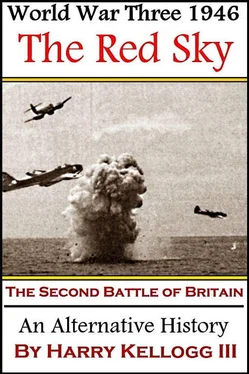Harry Kellogg III - The Red Sky - The Second Battle of Britain
Здесь есть возможность читать онлайн «Harry Kellogg III - The Red Sky - The Second Battle of Britain» весь текст электронной книги совершенно бесплатно (целиком полную версию без сокращений). В некоторых случаях можно слушать аудио, скачать через торрент в формате fb2 и присутствует краткое содержание. Год выпуска: 2014, ISBN: 2014, Издательство: CreateSpace Independent Publishing Platform, Жанр: Альтернативная история, prose_military, на английском языке. Описание произведения, (предисловие) а так же отзывы посетителей доступны на портале библиотеки ЛибКат.
- Название:The Red Sky: The Second Battle of Britain
- Автор:
- Издательство:CreateSpace Independent Publishing Platform
- Жанр:
- Год:2014
- ISBN:978-1-505-27311-3
- Рейтинг книги:3 / 5. Голосов: 1
-
Избранное:Добавить в избранное
- Отзывы:
-
Ваша оценка:
The Red Sky: The Second Battle of Britain: краткое содержание, описание и аннотация
Предлагаем к чтению аннотацию, описание, краткое содержание или предисловие (зависит от того, что написал сам автор книги «The Red Sky: The Second Battle of Britain»). Если вы не нашли необходимую информацию о книге — напишите в комментариях, мы постараемся отыскать её.
Warning This second book is set in the World War Three 1946 universe. A universe where Stalin Learns of “Operation Unthinkable”, Churchill’s ill-conceived plan to invade the USSR. He strikes first and attacks the West when it is at its weakest point and the Red Army is at its strongest. In Book Two we continue to explore one of the greatest “what ifs” in history. Who would have prevailed the Red Army or the forces of the Free World in an all out war, after the defeat of the Axis powers?
As Book One World War Three 1946 — The Red Tide — Stalin Strikes First ends, we find the Red Army has smash the feeble western armies in Germany and then France. America’s atomic scientists have been incapacitated by a dirty bomb containing polonium, smuggled in and detonated by a real NKVD spy George Koval. Who in our reality had access to the world’s only supply of the deadliest substance on earth, when he worked on producing the Mark III atomic bomb. Sometimes facts are stranger than fiction.
The Allies have temporarily stopped Stalin on the border of Spain and France where the Pyrenees Mountains makes a formidable barrier. As the Soviet version of the Blitzkrieg grinds to a temporary halt, Britain is given a chance to see the error of its wicked, capitalistic ways and to join the workers of the world. When this offer is rejected the Red Air Force prepares for an all-out attack with odds approaching five to one. Will the many, once again owe so much to the few of the RAF?
And where are the Americans? Have they abandoned their greatest ally? Have they scrapped too many of their planes and can they retool their economy, an economy that has switched almost totally to consumer products. Can they once again become the arsenal of democracy? Will they be in time to save the Royal Air Force?
Using a combination of their own skills and well-designed late war planes like the Tu 2S, the Yak 3, Yak 9 and the Lag 7 along with their newest jet fighters the MiG 9 Fargo and Yak 15 Feather, the Soviets will battle the Spitfires, Typhoons, Lincolns and Meteors of the RAF in a second battle for the skies over the British Isles.
Stalin is convinced that the next war, against the capitalist Amerikosi, will be in the air over Europe and the Soviet industrial machine starts to concentrate on air to air and surface to air missiles. These missiles are improved versions of the German Wasserfal and X4 missile. These Nazi wonder weapons were not developed in time to save the Thousand Year Reich. Brought to fruition by the Soviet industrial complex under the guidance of Sergo Peskov, the missiles wreak early havoc to the bomber streams of the RAF and USAAF. The era of massed attacks, by the manned strategic bomber, appears to be over.
These books are not written in any traditional style. They are a combination of historical facts, oral histories, third person and first person fictional accounts. They read more like an oral history or an entertaining history book complete with footnotes. I was inspired by “The Good War”: An Oral History of World War Two by Studs Terkel (1985 Pulitzer Prize for General Fiction) and Cornelius Ryan’s wonderful books “The Longest Day” and “A Bridge too Far”. I was especially captivated by Bill Bryson’s A Short History of Nearly Everything. Where the author explores the history of everyday objects and tells stories that captivate and educate all of us on the history of… well everything. Hopefully I have used their techniques of storytelling competently enough to entertain you for a few days.












